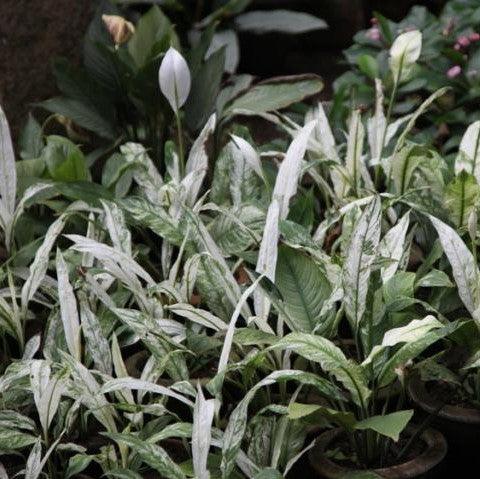

Description
- Common name:
- White Leaved Peace Lily
- Regional name:
- Marathi - Spathiphyllum Hicolor
- Category:
- Indoor Plants, Groundcovers
- Family:
- Araceae or Alocasia family
-
Introduction The White-Leaf Peace Lily (Spathiphyllum) is a popular indoor plant known for its elegant white blooms, air-purifying properties, and low-maintenance care requirements. This guide provides you with all the necessary information to grow, care for, and enjoy the benefits of your White-Leaf Peace Lily.
1. Basic Information
- Scientific Name: Spathiphyllum wallisii
- Family: Araceae
- Origin: Central and South America
- Common Names: White-Leaf Peace Lily, Peace Lily, Spath
2. Plant Characteristics
- Growth Habit: Evergreen, herbaceous perennial
- Height: 1-4 feet
- Foliage: Glossy, dark green leaves
- Blooms: White, hooded flowers (spathes) surrounding a white or yellow spadix
- Bloom Time: Spring to late summer
- Toxicity: Toxic to pets and humans if ingested
3. Growing Requirements
- Light: Bright, indirect sunlight
- Temperature: 65-80°F (18-27°C)
- Humidity: 40-60%, higher is preferred
- Soil: Well-draining, peat-based potting mix
- Water: Keep consistently moist, but not waterlogged
- Fertilizer: Balanced, liquid houseplant fertilizer diluted to half strength, applied monthly during the growing season
4. Care and Maintenance
- Repotting: Repot every 2-3 years or when the roots outgrow the current container
- Pruning: Remove dead leaves and spent flowers to encourage new growth
- Pest Control: Check for mealybugs, spider mites, and scale insects; treat with insecticidal soap or neem oil if necessary
- Cleaning: Wipe leaves with a damp cloth to remove dust and maintain photosynthesis efficiency
5. Propagation
- Division: Divide the plant during repotting by separating the root ball into smaller sections, each with at least one healthy leaf and root system
- Cuttings: Root tip cuttings in water or moist potting mix
6. Troubleshooting
- Yellow Leaves: Overwatering, underwatering, or too much direct sunlight
- Brown Leaf Tips: Low humidity or excess fertilizer
- Wilting: Underwatering or root rot from overwatering
- Failure to Bloom: Insufficient light, inadequate nutrients, or improper watering
7. Benefits
- Air Purification: Removes harmful chemicals like formaldehyde, benzene, and ammonia from the air
- Aesthetic Appeal: Adds a touch of elegance and tropical flair to any room
- Low Maintenance: Easy to care for, making it an ideal choice for beginners and busy plant owners
Conclusion The White-Leaf Peace Lily is a beautiful and versatile indoor plant that provides numerous benefits, including air purification and aesthetic appeal. By following this guide and understanding its growth requirements and care needs, you can enjoy a thriving Peace Lily in your home or office for years to come.
